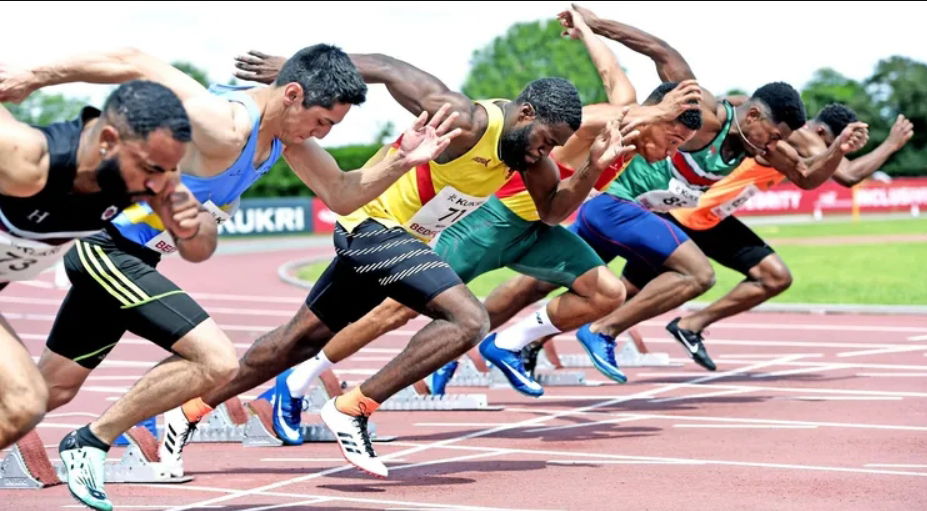

As Netflix’s Sprint Season 2 screened on the digital screen, the 100-meter athletic champ and America’s iconic sports star, Noah Lyles, stepped out from a limousine at Times Square, New York, as viewers looked for their favorite athlete to pop up at least once. Some found them, some didn’t. Nevertheless, amidst much fanfare, the experienced cohorts of track and field athletes were more concerned. Obviously, the cohorts want the best of their profession to be put into its deserving light. But it didn’t happen, at least not for the track coach Rodney Green and track and field’s former champion Justin Gatlin. And why is that? Before answering, let’s see why Netflix and the producing agency Box to Box put out a show on track and field.
Watch What’s Trending Now!
Before producing Sprint-2, Box to Box garnered massive audience attention from their Formula1: Drive to Survive docuseries. Theirs and Netflix’s aim in the Sprint-2 series is to provide a relatable track drama to the audience and put forward the athletes’ dedication, challenges, and triumphs in that sporting arena. And they did it superbly. But there’s a string attached, especially when a vast field is to be put on the small screen.
ADVERTISEMENT
Netflix’s ‘Sprint’ isn’t fair to all
Surely, Netflix couldn’t encompass the wholesomeness of track and field through its every nuance. On this, Justin Gatlin and Rodney Green agreed. It is difficult to put everything in docuseries like the Sprint-2. But, ”I would like them to do more on the African, man!” said Rodney. He continues that there is a surge in sprinters from different African countries like Liberia, Tulu or Tulu Nadu, and Ivory Coast. Rodney suggested Akani Simbine and his commitment to the next athletic generation in South Africa.”…but he has a whole emergence of young kids who he’s fostering behind him who will carry the torch,” said Rodney on the Ready Set Go YouTube channel with Justin Gatlin. Invoking curiosity, Rodney asked who would be the next emerging athlete from the African countries.

ADVERTISEMENT
Spot on, Rodney! Yes, major African sprinters are coming from a bleak and heavy struggling ground and putting their mark on the global athletics map. Sprinters like Ebony Morrison or Derartu Tulu from Africa didn’t make it in that Netflix docuseries. However, their achievements seem more based on athletics’ underlying equity. Since their journey started from the more underprivileged ground compared to the U.S..
ADVERTISEMENT
Winning the African Championship in a 100m hurdle, Morrison caught the eyes of the spectators with promising stances for achievements in the future. Whereas, from herding cattle, Derartu Tulu reached the feat when she became the first Ethiopian and first black African woman to win a Gold Medal in the Olympics. The African promise may not triumph in the series, but surely it does on the vying tracks and fields around the globe. And the veteran athletes were right to point it out, as they dished out other backdrops in the Sprint-2.
Top Stories
NFL Makes Final Punishment Decision on Shedeur Sanders Incident in Week 17

Chiefs Coach Abruptly Leaves Andy Reid’s Staff Amid Titans’ Rumored Interest in Matt Nagy

“I’d Be Dead”: NASCAR Legend Credits Kevin Harvick for Saving His Life

Jerry Jones Finally Acknowledges the Dak Prescott Gamble Hasn’t Paid Off; Confirms Painful Changes Ahead for Cowboys

Historic NASCAR Track to Change Its Iconic Name as City Council Moves to Auction It Up

Two-Time Venezuelan UFC Champion Clears Stance on Trump’s Takeover and Maduro’s Capture

Compelling stories are everywhere
Whereas Rodney Green took a jibe on the aspect of African Sprinters’ absence in the docuseries, Justin Gatlin was riled up by the comparison tone laid on to introduce the American icon—Noah Lyles and Fred Kerley with a heavy and husky sound emphasizing the syllables of Noah. Justin has another point to make, which comprises the hurdlers. “They compartmentalizing like oh that’s sprinter—that’s fast runners. But realize, don’t they don’t realize like hurdlers are sprinters too,” said the most-medaled in major championships, Justin. Also, he underlined the women’s side’s story, balancing with men’s athletes. Talking about the more compelling stories from both men and women athletes, Justin put forward many names— “Look at Alaysha’s story,” “Look at Masai,” and many other prominent names from the woman cohort. But why is it important to have all those things in a docuseries?
ADVERTISEMENT
In answering that question, Justin Gatlin and Rodney Green upheld the importance of the vision, dream, and goal of athletes, for which they worked tirelessly. And, sometimes, with heavy loads or burdens over the years, many things happen in them. However, with promotions, such as the Sprint-2, many athletes gained a valuable fanbase. That fanbase is important to keep them going when their goals are unmet in that single event in a year.
ADVERTISEMENT
ADVERTISEMENT
ADVERTISEMENT

